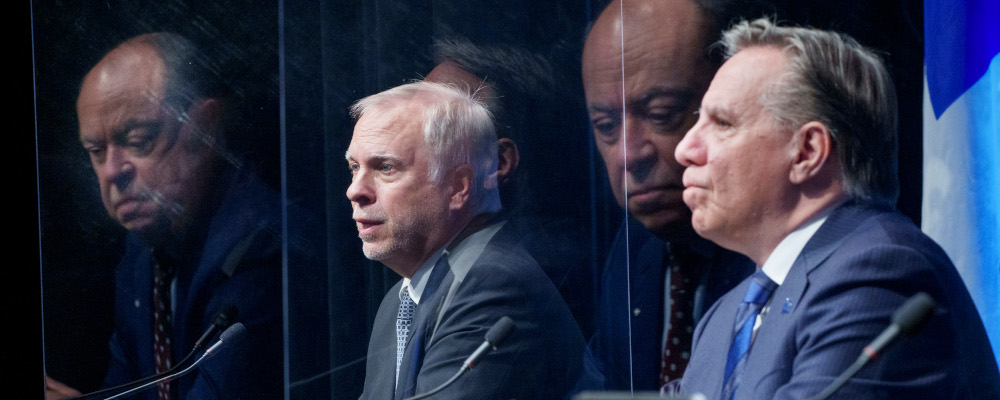Federal health minister Yves Duclos offered an open door invitation for premiers to impose mandatory vaccination when he mused publicly about the likelihood of such a policy on January 7th. So it should be no surprise when Canada’s most illiberal premier, Quebec’s Francois Legault, walked through that open door a few days later with the announcement of a new “health care contribution” on the unvaccinated.
At the outset, it should be stated clearly: Quebec’s new proposed health tax on the unvaccinated is a terrible idea. It is likely contrary to the Canada Health Act and raises serious constitutional questions.
Tying healthcare costs to risk is not itself a novel concept. Private health insurers take into account individual circumstances when assessing premiums, including risks that may result from lifestyle choices such as obesity, high-risk activities, and vaccination against infectious diseases.
However, the government of Quebec is not a private health insurer. It must operate according to the principles of the Canada Health Act, chief among which is universality: health care is free at the point of service regardless of prior comorbidities, lifestyle choices, or past decisions to accept or refuse medical treatment. If the principle of universality is to be respected, the question of individual circumstances cannot justify additional burdens to treatment. Every citizen of Quebec who holds a RAMQ health card and pays taxes has equal access to care, full stop.
The consequence of Quebec’s clear violation of the Canada Health Act’s principle of universality ought to be the denial of federal health transfer payments to the province. But for obvious political reasons, that won’t happen. Not from this Prime Minister, and not when the targeted group is so deeply unpopular. But there remain constitutional and ethical problems with the proposition to tax the unvaccinated.
Section 1 of the Québec Charter provides that “Every human being has a right to life, and to personal security, inviolability and freedom.” It’s true that neither the Quebec nor the Canadian Charter protects economic liberty, so the tax itself is not a constitutional violation. However, imposing additional, and what Legault has called “significant” taxes, is a transparent attempt to coerce those who are unwilling to be vaccinated.
For most Quebeckers, an additional financial burden of several hundred dollars a month would be acutely stressful, and for some devastating. Especially when the past two years have created and exacerbated economic hardships for many. The suggestion that one could avoid this tax by acquiescing to the vaccine all but guarantees their choice to become vaccinated will be made under coercion, and not freely. This presents a clear interference with section 1’s right to personal security.
Imposing a fine as a condition to accessing an essential service such as health care goes above and beyond other prerequisites to engage in certain activities in society, such as wearing seatbelts to drive or refraining from smoking in indoor spaces. Access to health care is a fundamental need that arises from being a human being in a vulnerable body.
Quebec, like a few other provinces, actually does have a much more straightforward mechanism for compelling vaccination. Compulsory vaccination is explicitly permitted in its Public Health Act. And yet it’s safe to assume that no Quebecker would consent to a mechanism by which people were physically bound and had their arms injected with the vaccine. Why? We’re a country that respects the basic dignity of human beings and the principle of bodily autonomy and integrity.
The fact that an apparent majority of Canadians polled this week support the health tax, which indirectly achieves the same end of compelling individuals to be vaccinated against their will, highlights this cognitive dissonance.
Although the route of the health tax is less medieval than simple brute coercion, it raises additional concerns from a privacy perspective. Would implementing the policy require an amendment of existing health privacy laws in order to permit individuals’ vaccination status to be shared with the tax collectors?
It is also unclear if the government will be able to argue that a blanket tax on the unvaccinated is the least intrusive means available to them to blunt the real issue of the unvaccinated’s disproportionate occupancy of ICU beds. Unvaccinated individuals present wildly varying degrees of risk of hospitalization, depending on age, previous comorbidities, ability to work from home, and indeed prior infection. This has been acknowledged by countries such as Italy and Greece, who are only imposing the health tax on citizens over the age of 50 or 60 respectively who are at much higher risk of severe outcomes from catching the virus unvaccinated
In a pluralistic society, it’s unrealistic to expect a 100 percent vaccination rate. With 90 percent of eligible adults in Quebec vaccinated, any analysis of whether a measure aiming to punish the remaining holdouts must consider if other measures were possible before this one. The U.S. and UK have now approved Pfizer’s antiviral pill which reduces rates of hospitalization by 88 percent. Monoclonal antibody treatments are now available to high-risk individuals in Canada and are shown to reduce hospitalization by 80 percent.
Even in public health emergencies, certain norms of basic respect for human beings and their right to make free and informed decisions must not be trespassed. Charging mandatory levies against the unvaccinated simply crosses the line of what may be permitted in a free society, and should be condemned outright.
Recommended for You

Laura David: Red pill, blue pill: Google has made its opening salvo in the AI-news war. What’s Canadian media’s next move?

The Notebook by Theo Argitis: Mark Carney’s first major tests

The Weekly Wrap: Trudeau left Canada in terrible fiscal shape—and now Carney’s on clean-up duty

Ben Woodfinden: Lament for an ‘elbows up’ nation




